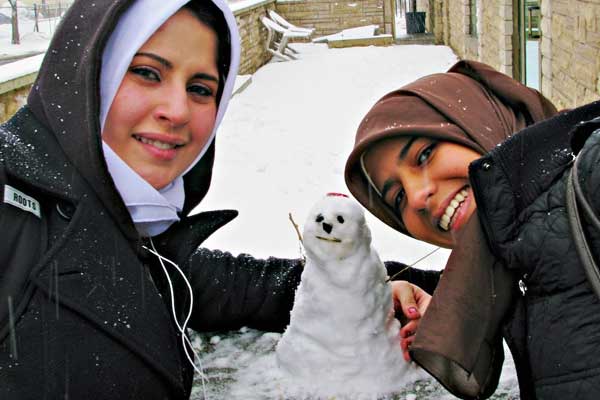Being able to understand the Arabic of the Quran directly is a dream come true for any Muslim, especially the one who yearns to become closer to their Creator.
There was a time when I would sit with the Quran mus-haf in my hands, looking intently at the Arabic script, tears of frustration and longing flowing from my eyes, because I earnestly desired to be able to understand the Arabic of the Quran directly, without needing a translation.
Why, you might wonder? Why is a translation not enough?
Well, for starters, the Quran did not exist in the form of a hand-held book during the life of Prophet Muhammad. It existed only as a verbal kalaam (spoken word) of Allah, which was memorized in its entirety, verbatim i.e. by listening and repetition.
The gradual memorization of the Quran was reinforced by its daily recitation in prayer by the Muslims who dwelled in Arabia at that time.
This method – listening to the Quran and repeating it aloud – was also used by archangel Jibreel whenever he revealed the Quran to Prophet Muhammad during one of their sessions, viz. he would recite the verses of the Quran, and Prophet Muhammad would repeat them aloud until he had them memorized.
The Quran in spoken (verbal/audio) form has an effect on the human heart that no other spoken word can ever have.
The human soul has been created by Allah in such a way, that it yearns to listen to a soothing rhythmic melody that touches the heart and stirs the soul, especially when the soul is distressed and sad, or even when it is euphoric and overwhelmed with joy.
The human soul yearns to listen to a melodious and rhythmic kalaam, especially when it is alone (without human company). It is for this reason that people listen to music and musical instruments when they are lonely, sad, or very happy.
However, it is the Quran for which the soul really pines, and which is the only kalaam (spoken word) in the world that can truly soothe and satisfy it.
And the Quran cannot touch the heart of a person as deeply, and with as much spirit, as when the listener is a devout, Allah-fearing Muslim who has the correct Islamic belief (aqeedah) in their heart, and he or she is able to easily understand the Arabic of the Quran.
Sadly, for most new Muslims, and those born Muslims who are non-Arabs, understanding the Quran directly remains a highly coveted but elusive and unattainable goal.
But is this dream really that difficult to attain?
How to Learn the Arabic of the Quran?
There are a plethora of academic courses and educational programs out there that endeavor to teach non-Arab Muslims how to read and recite the Arabic of the Quran, all praises to Allah.
There are some advanced ones as well, which aim to impart deeper knowledge of the Arabic of the Quran to their students, allowing the latter to be able to understand the Arabic of the Quran itself, directly.
Which program a student of the Quran chooses to enroll in, should depend upon what their vision is.
Do they wish to be able to recite the Quran with perfect linguistic expertise, the way reciters (qurra’) do, without making a single mistake?
Do they want to study the meanings and explanations (tafsir) of the entire Quran once in their life, in order to get to know properly, learn, and act upon what their Creator has revealed to mankind?
Or do they want to be able to do both of the above, in addition to garnering the requisite insight and analytical ability to be able to reflect and ponder deeply upon the Quran throughout the remainder of their lives, being able to relate its messages to personal life circumstances, current affairs, and to the seemingly random events happening around the world?
The Arabic of the Quran: Unparalleled and Unique
If the last scenario is a part of the student’s vision, then striving to be able to understand the Arabic of the Quran without needing a translation should definitely be a top priority in their list when they search for the educational program to enroll in.
One important point to remember is that the Arabic of the Quran is unique, and it is not the same as the linguistic and dialectic Arabic languages spoken throughout the Arab world. Even the Arabic found in the text of Hadith is different from the Arabic of the Quran.
Moreover, all the Arabic words that occur in the Quran are repeated again and again throughout its entirety, with the exception of those that occur in the very last juz’ (which has much shorter words and surah’s than the rest of the Quran).
This actually makes it much easier to grasp the Arabic of the Quran, as opposed to learning the general Arabic language from scratch using other textbooks and literature.
What I am trying to say is that in order to be able to learn, to decipher the Arabic of the Quran, the student of knowledge should start with and focus on the Quran itself, keeping it as their primary text resource, using other texts such as dictionaries and lexicons as supplementary resources.
The blessings of the words of Allah will soon make the student’s journey of gaining knowledge of Arabic easy and fruitful, Insha’Allah.
And We have indeed made the Quran easy to understand and remember. Then is there any that will receive admonition? (54:17)
It is the promise of Allah that the Quran has been made easy for “dhikr”: remembrance, admonition, reminders, and memorization.
The Method that Worked For Me
Quite soon after that memorable moment in my life, in which I sat crying with frustration whilst staring longingly at the text of the Quran mushaf in my hands, I got a chance to join a course that used a surprisingly simple method to teach enrolled students how to understand the Quran directly.
Before I describe this simple yet amazingly effective method, I must give due credit to the person who came up with the idea for it: esteemed sister Farhat Hashmi.
The method she came up with has taught thousands of her students, including me, how to understand the Arabic of the Quran directly, via courses conducted under the umbrella of her brainchild: Al-Huda.
It involves the student memorizing the word-to-word translation of all the words in a page (or two) of the Quran every day, and having a teacher test this memorized lesson the next academic day. Back when I was a student, we had to memorize the daily lesson at least 10 times. This activity took about an hour after class.
During the test that the teacher took the next day, asking the student to translate word-to-word any verse or part of a verse from the page(s) of the Quran that had been memorized, the student had to hold an Arabic Quran that had no translation printed in it, instead of their ‘textbook’ Quran, which had the word-to-word translation printed in it, from which they had memorized their lesson.
This method is effective because the words of the Quran, like I said above, keep getting repeated throughout its entirety, thus eventually allowing the student to be able to recall the translation of most of the easier words of the Quran from memory, as they go through the in-depth study of the whole Quran.
Conclusion: Strive for the Deepest Knowledge of Allah’s Book
It is truly a great blessing for a Muslim to be granted knowledge of the Quran.
This knowledge is blessed in any form, be it in-depth or cursory. The real icing on the cake for any Muslim, however, would be if they can not only recite the Quran perfectly, write its Arabic in beautiful script, gain deep understanding of its exegesis (via study of tafsir), but also, to be able to fully understand the Arabic words of the Quran directly, and thus feel a deeply spiritual bond with Allah whenever its recitation falls into their ears, or whenever they pick up an Arabic mus-haf of Allah’s Book.
To feel your heart tremble with humility, your skin get tingly, your breathing get heavy, your eyes well up and flow with tears of love for the Divine, and your base self (nafs) feel utterly broken and subjugated before Allah as a result of the powerful effect of His words upon your soul, is an experience that no Muslim should perish without living through!
(From Discovering Islam’s archive.)
The post How to Understand the Arabic of the Quran? appeared first on About Islam.
source
https://aboutislam.net/reading-islam/living-islam/can-non-arab-muslims-engage-quran/
 Read Also:
Read Also: 

















